Pigalab D 75/20 Capsule 10's
MRP ₹182.5
(Inclusive of all Taxes)
₹27.4 Cashback (15%)
Provide Delivery Location
Online payment accepted
 Prescription drug
Prescription drugWhats That
Composition :
Manufacturer/Marketer :
Consume Type :
Expires on or after :
Return Policy :
About Pigalab D 75/20 Capsule
Pigalab D 75/20 Capsule belongs to an anticonvulsant class of medicines. It is used in the treatment of diabetic neuropathic pain and fibromyalgia. Neuropathic pain/ peripheral neuropathy is pain that occurs when the nervous system is not working properly or is damaged. Diabetic neuropathic pain/diabetic neuropathy is a condition causing moderate to severe pain due to damage of nerves in the thigh, hip, buttock and leg regions. Symptoms may include tingling, shooting pain, burning, or even an electric shock sensation. Fibromyalgia is a chronic condition with moderate pain and tenderness all over the body resulting in fatigue and trouble sleeping.
Pigalab D 75/20 Capsule is a combination of Pregabalin and Duloxetine. Pregabalin belongs to an anticonvulsant class of drugs, whereas Duloxetine is a selective serotonin reuptake (SSRI) inhibitor. This medicine mainly works by increasing the chemical messengers in the brain responsible for regulating pain.
Pigalab D 75/20 Capsule can be taken with or without food or as prescribed by your doctor. Pigalab D 75/20 Capsule may cause certain side effects such as nausea, constipation, headache, dry mouth, increased sweating, loss of appetite, dizziness, and burning sensation. These side effects do not require medical attention and gradually resolve over time. However, if any of these side effects persist, inform your doctor.
Pigalab D 75/20 Capsule should be avoided if you are allergic to it. Inform your doctor if you have any liver or kidney disease, seizures (fits), mania, bipolar disorder, glaucoma (an eye condition), bleeding disorders, or are at risk of hyponatremia (low sodium levels, especially in patients taking diuretics or water pills). If you are pregnant or breastfeeding, inform your doctor before taking this medicine. It is not recommended for use in children and young adults as it increases the risk of suicidal tendencies.
Uses of Pigalab D 75/20 Capsule
Directions for Use
Key Benefits
Pigalab D 75/20 Capsule contains Pregabalin and Duloxetine. Pregabalin belongs to an anticonvulsant class of drugs, whereas Duloxetine is a selective serotonin reuptake (SSRI) inhibitor. This medicine mainly works by increasing the chemical messengers in the brain responsible for regulating pain. Pigalab D 75/20 Capsule effectively treats neuropathic pain, and improves nerve conduction for proper nerve signal functioning in the body.
Storage
- Inform your doctor about dizziness symptoms. They may adjust your medication regimen or prescribe additional medications to manage symptoms.
- Follow your doctor's instructions for taking medication, and take it at the same time every day to minimize dizziness.
- When standing up, do so slowly and carefully to avoid sudden dizziness.
- Avoid making sudden movements, such as turning or bending quickly, which can exacerbate dizziness.
- Drink plenty of water throughout the day to stay hydrated and help alleviate dizziness symptoms.
- If you're feeling dizzy, sit or lie down and rest until the dizziness passes.
- Track when dizziness occurs and any factors that may trigger it, and share this information with your doctor to help manage symptoms.
- Wear compression garments like stockings, sleeves, or gloves to apply pressure and help stop fluid from building up, especially after the swelling goes down.
- Move around and do exercises to help the fluid circulate, especially in swollen limbs. Ask your doctor for specific exercises.
- Raise the swollen area above your heart level several times a day, even while sleeping, to help reduce swelling.
- Gently massage the swollen area with firm but not painful pressure.
- Keep the swollen area clean and moisturized to prevent injury and infection.
- Reduce salt intake to help prevent fluid from building up and worsening the swelling, as advised by a doctor.
- If the swelling does not get better after a few days of home treatment or worsens, consult your doctor right away.
- Confusion is a major psychotic disorder that needs immediate medical attention.
- Acknowledge your experience and put effort to control confusion.
- Avoid smoking and alcohol intake as it can worsen the condition and increase your confusion.
- Practice meditation and yoga to avoid anxiety, which can be one of the leading causes.
- Talk to your dietician and consume food that can improve your mental health.
- Inform your doctor about your constipation symptoms. They may adjust your medication or advise alternative treatments.
- Stay hydrated by drinking sufficient of water (at least 8-10 glasses a day) to help soften stool and promote bowel movements.
- Increase fibre intake by eating foods high in fibre, such as fruits, whole grains, vegetables and legumes, to help bulk up the stool.
- Establish a bowel routine by trying to go to the bathroom at the same time each day to train your bowels.
- Engaging in regular exercise, like walking or yoga, can support in bowel movement stimulation.
- Consult your doctor if constipation persists, and discuss alternative treatments or adjustments to your medication.
- Inform Your Doctor: Notify your doctor immediately about your diarrhoea symptoms. This allows them to adjust your medication or provide guidance on managing side effects.
- Stay Hydrated: Drink plenty of fluids to replace lost water and electrolytes. Choose water, clear broth, and electrolyte-rich drinks. Avoid carbonated or caffeinated beverages to effectively rehydrate your body.
- Follow a Bland Diet: Eat easy-to-digest foods to help firm up your stool and settle your stomach. Try incorporating bananas, rice, applesauce, toast, plain crackers, and boiled vegetables into your diet.
- Avoid Trigger Foods: Steer clear of foods that can worsen diarrhoea, such as spicy, fatty, or greasy foods, high-fibre foods, and dairy products (especially if you're lactose intolerant).
- Practice Good Hygiene: Maintain good hygiene to prevent the spread of infection. To stay healthy, wash your hands frequently, clean and disinfect surfaces regularly, and avoid exchanging personal belongings with others.
- Take Anti-Diarrheal Medications: If your doctor advises, anti-diarrheal medications such as loperamide might help manage diarrhoea symptoms. Always follow your doctor's directions.
- Keep track of your diarrhoea symptoms. If they don't get better or worse or are accompanied by severe stomach pain, blood, or dehydration signs (like extreme thirst or dark urine), seek medical help.
- Inform your doctor about the nausea and discuss possible alternatives to the medication or adjustments to the dosage.
- Divide your daily food intake into smaller, more frequent meals to reduce nausea.
- Opt for bland, easily digestible foods like crackers, toast, plain rice, bananas, and applesauce.
- Avoid certain foods that can trigger nausea, such as fatty, greasy, spicy, and smelly foods.
- Drink plenty of fluids, such as water, clear broth, or electrolyte-rich beverages like coconut water or sports drinks.
- Use ginger (tea, ale, or candies) to help relieve nausea.
- Get adequate rest and also avoid strenuous activities that can worsen nausea.
- Talk to your doctor about taking anti-nausea medication if your nausea is severe.
- Record when your nausea occurs, what triggers it, and what provides relief to help you identify patterns and manage your symptoms more effectively.
- Hydrate your body: Drink enough water to prevent dehydration and headaches.
- Calm Your Mind: Deep breathing and meditation can help you relax and relieve stress.
- Rest and Recharge: Sleep for 7-8 hours to reduce headache triggers.
- Take rest: lie down in a quiet, dark environment.
- Cold or warm compresses can help reduce tension.
- Stay Upright: Maintain good posture to keep symptoms from getting worse.
- To treat headaches naturally, try acupuncture or massage therapy.
- Over-the-counter pain relievers include acetaminophen and ibuprofen.
- Prescription Assistance: Speak with your doctor about more substantial drug alternatives.
- Severe Headaches: Seek emergency medical assistance for sudden, severe headaches.
- Frequent Headaches: If you get reoccurring headaches, consult your doctor.
- Headaches with Symptoms: Seek medical attention if your headaches include fever, disorientation, or weakness.
Drug Warnings
Pigalab D 75/20 Capsule should be avoided if you are allergic to any of the components in it. Do not stop taking Pigalab D 75/20 Capsule suddenly without your doctor’s advice, as it may cause withdrawal symptoms like dizziness, tingling sensation, sleep disturbances, restlessness, nausea or vomiting, headache, or excessive sweating. Inform your doctor if you have any liver or kidney disease, seizures (fits), mania, bipolar disorder, or glaucoma (an eye condition). Pigalab D 75/20 Capsule may increase suicidal thoughts, so it is advised to use caution in patients with mania, bipolar disorder or depression. It is not recommended for use in children below 18 years of age as the safety and efficacy of this medicine are not established. Pregnant or breastfeeding mothers should inform the doctor before using Pigalab D 75/20 Capsule .
Drug-Drug Interactions
Drug-Drug Interactions
Login/Sign Up
Taking Tranylcypromine with Pigalab D 75/20 Capsule can increase the risk of serotonin syndrome(a condition in which a chemical called serotonin increase in your body).
How to manage the interaction:
Taking Tranylcypromine with Pigalab D 75/20 Capsule is not recommended but can be taken together if prescribed by a doctor. However, consult a doctor if you experience confusion, fever, excessive sweating, shivering, pain in the muscles or stiffness, stomach cramps, nausea, vomiting, and diarrhoea. Do not discontinue any medications without consulting your doctor.
Taking Pigalab D 75/20 Capsule with selegiline may increase the risk of serotonin syndrome (a condition in which a chemical called serotonin increases in your body).
How to manage the interaction:
Although there is an interaction between Pigalab D 75/20 Capsule and Selegiline, they can be taken together if prescribed by a doctor. However, consult a doctor if you experience confusion, fever, excessive sweating, shivering, blurred vision, pain in the muscles, stomach cramps, nausea, vomiting, and diarrhoea. Do not discontinue any medications without consulting your doctor.
Coadministration of safinamide with Pigalab D 75/20 Capsule can increase the risk of serotonin syndrome (a condition in which a chemical called serotonin increases in your body).
How to manage the interaction:
Taking Safinamide with Pigalab D 75/20 Capsule is not recommended as it can result in an interaction, but they can be taken together if prescribed by a doctor. However, consult a doctor if you experience confusion, fever, excessive sweating, shivering, pain in the muscles, stomach cramps, nausea, vomiting, and loose stools. Do not discontinue any medications without consulting a doctor.
Taking phenelzine with Pigalab D 75/20 Capsule can increase the risk of serotonin syndrome(a condition in which a chemical called serotonin increase in your body).
How to manage the interaction:
Taking Pigalab D 75/20 Capsule with Phenelzine is not recommended, but they can be taken together if prescribed by a doctor. However, consult a doctor if you experience confusion, fever, excessive sweating, shivering, blurred vision, pain in the muscles, stomach cramps, nausea, vomiting, and diarrhoea. Do not discontinue any medications without consulting your doctor.
Taking Rasagiline with Pigalab D 75/20 Capsule can increase the risk of serotonin syndrome (a condition in which a chemical called serotonin increases in your body).
How to manage the interaction:
Taking Rasagiline and Pigalab D 75/20 Capsule is not recommended as they can possibly result in an interaction, but they can be taken together if prescribed by a doctor. However, consult a doctor if you experience confusion, fever, excessive sweating, shivering, pain in the muscles, stomach cramps, nausea, vomiting, and loose stools. Do not discontinue any medications without consulting a doctor.
Coadministration of eliglustat and Pigalab D 75/20 Capsule can significantly increase the blood levels of eliglustat. This may increase the risk of irregular heart rhythm.
How to manage the interaction:
Taking Pigalab D 75/20 Capsule with Eliglustat is not recommended, but they can be taken together if prescribed by a doctor. However, consult a doctor if you experience sudden dizziness, lightheadedness, fainting, shortness of breath, slow heart rate, or weak pulse. Do not discontinue any medications without consulting your doctor.
Taking Pigalab D 75/20 Capsule with Linezolid can increase the risk of serotonin syndrome(a condition in which a chemical called serotonin increase in your body).
How to manage the interaction:
Although taking Pigalab D 75/20 Capsule with Linezolid is not recommended, they can be taken together if prescribed by a doctor. However, consult a doctor if you experience confusion, fever, excessive sweating, shivering, blurred vision, pain in the muscles, stomach cramps, nausea, vomiting, and diarrhoea. Do not discontinue any medications without consulting a doctor.
Coadministration of metoclopramide with Pigalab D 75/20 Capsule increase the risk of serotonin syndrome(a condition in which a chemical called serotonin increase in your body).
How to manage the interaction:
Taking Metoclopramide with Pigalab D 75/20 Capsule is not recommended, they can be taken together if prescribed by a doctor. However, consult a doctor if you experience any unusual symptoms. Do not discontinue any medications without consulting a doctor.
Taking Pigalab D 75/20 Capsule with procarbazine can increase the risk of serotonin syndrome(a condition in which a chemical called serotonin increase in your body).
How to manage the interaction:
Taking Pigalab D 75/20 Capsule with Procarbazine is not recommended, but they can be taken together if prescribed by a doctor. However, consult a doctor if you experience confusion, fever, excessive sweating, shivering or shaking, pain in the muscles, stomach cramps, nausea, vomiting, and diarrhoea. Do not discontinue any medications without consulting your doctor.
When Pigalab D 75/20 Capsule and Esketamine are taken together, it may increase the risk of side effects.
How to manage the interaction:
Although taking Pigalab D 75/20 Capsule and Esketamine together can result in an interaction, it can be taken if a doctor has prescribed it. However, if you experience symptoms such as drowsiness, confusion, difficulty concentrating, and impairment in thinking, judgment, reaction speed, and motor coordination. Do not exceed the doses, frequency, or duration of usage advised by a doctor. Avoid driving or operating dangerous machinery. Do not stop using any medications without talking to a doctor.
Drug-Food Interactions
Drug-Food Interactions
Login/Sign Up
Diet & Lifestyle Advise
- Exercise regularly, which helps in reducing pain.
- Rest well, and get enough sleep.
- Always take a warm bath, as it can be soothing.
- Avoid smoking and alcohol consumption.
- Meditation and yoga can help lower stress, decrease pain sensitivity, and improves coping skills.
Side Effects of Pigalab D 75/20 Capsule
- Burning sensation
- Drowsiness
- Nausea
- Constipation
- Headache
- Dry mouth
- Increased sweating
- Loss of appetite
Habit Forming
Therapeutic Class
All Substitutes & Brand Comparisons
RX
Not for online salePredulox 75 Capsule 10's
Mesmer Pharmaceuticals
₹203.5
(₹18.32 per unit)
11% COSTLIERRX
Not for online salePbren-D 75/20 Capsule 10's
La Renon Healthcare Pvt Ltd
₹204
(₹18.36 per unit)
11% COSTLIERRX
Not for online saleRevlin-D 75/20 Capsule 10's
Eris Life Sciences Ltd
₹205
(₹18.45 per unit)
12% COSTLIER
Author Details
We provide you with authentic, trustworthy and relevant information
Drug-Diseases Interactions
Drug-Diseases Interactions
Login/Sign Up
FAQs
Pigalab D 75/20 Capsule contains Pregabalin and Duloxetine. Pregabalin belongs to an anticonvulsant class of drugs, whereas Duloxetine is a selective serotonin reuptake (SSRI) inhibitor. This medicine mainly works by increasing the chemical messengers in the brain responsible for regulating pain.
Do not stop using Pigalab D 75/20 Capsule suddenly as it can cause withdrawal symptoms. Your doctor will gradually reduce the dose based on your clinical condition.
Seek medical attention immediately if you notice any depressive thoughts while using Pigalab D 75/20 Capsule . Your doctor may change the dose or medicine to treat your condition.
Neuropathic pain/ peripheral neuropathy is pain that occurs when the nervous system is not working properly or is damaged.
Drug-Drug Interactions Checker List
- TRAMADOL
- FLUOXETINE
- MOCLOBEMIDE
- VENLAFAXINE
- AMITRIPTYLINE
Special Advise
- Do not stop taking Pigalab D 75/20 Capsule suddenly, as it may cause withdrawal symptoms.
- Do frequent blood tests to check your fasting blood glucose, HbA1c, and total cholesterol (TC) levels to reduce any serious side effects.
Disease/Condition Glossary
Diabetic Neuropathy: Diabetic neuropathic pain/diabetic neuropathy is a condition causing moderate to severe pain due to damage of nerves in the thigh, hip, buttock and leg regions. Symptoms may include tingling, shooting pain, burning, or even an electric shock sensation. It mainly occurs in patients suffering from Type II Diabetes.
Fibromyalgia: It is a chronic condition with moderate pain and tenderness of the muscle all over the body. It mainly occurs due to physical or psychological stress. Symptoms may include fatigue, tiredness, trouble sleeping, anxiety, headache and depression.

Have a query?
Alcohol
Safe if prescribed
Avoid alcohol consumption during treatment with $nmae as it may increase the risk of serious side effects and worsen your health.
Pregnancy
Consult your doctor
If you are pregnant, especially in the last trimester or planning pregnancy, inform your doctor before taking Pigalab D 75/20 Capsule . It may cause foetal abnormalities if taken in the last trimester of pregnancy. Your doctor may prescribe this medicine if the benefits outweigh the risks.
Breast Feeding
Consult your doctor
If you are breastfeeding, inform your doctor before taking Pigalab D 75/20 Capsule . Your doctor may prescribe this medicine if the benefits outweigh the risks.
Driving
Safe if prescribed
Pigalab D 75/20 Capsule may cause drowsiness. Hence, avoid driving vehicles or operating machines after taking Pigalab D 75/20 Capsule .
Liver
Consult your doctor
If you have liver conditions, inform your doctor before taking Pigalab D 75/20 Capsule . Your doctor may adjust the dose of this medicine or prescribe a suitable alternative based on your condition.
Kidney
Consult your doctor
If you have kidney conditions, inform your doctor before taking Pigalab D 75/20 Capsule . Your doctor may adjust the dose of this medicine or prescribe a suitable alternative based on your condition.
Children
Safe if prescribed
Pigalab D 75/20 Capsule is not recommended for children below 18 years as the safety and efficacy of use for this medicine are not established. Please seek medical advice for more information.




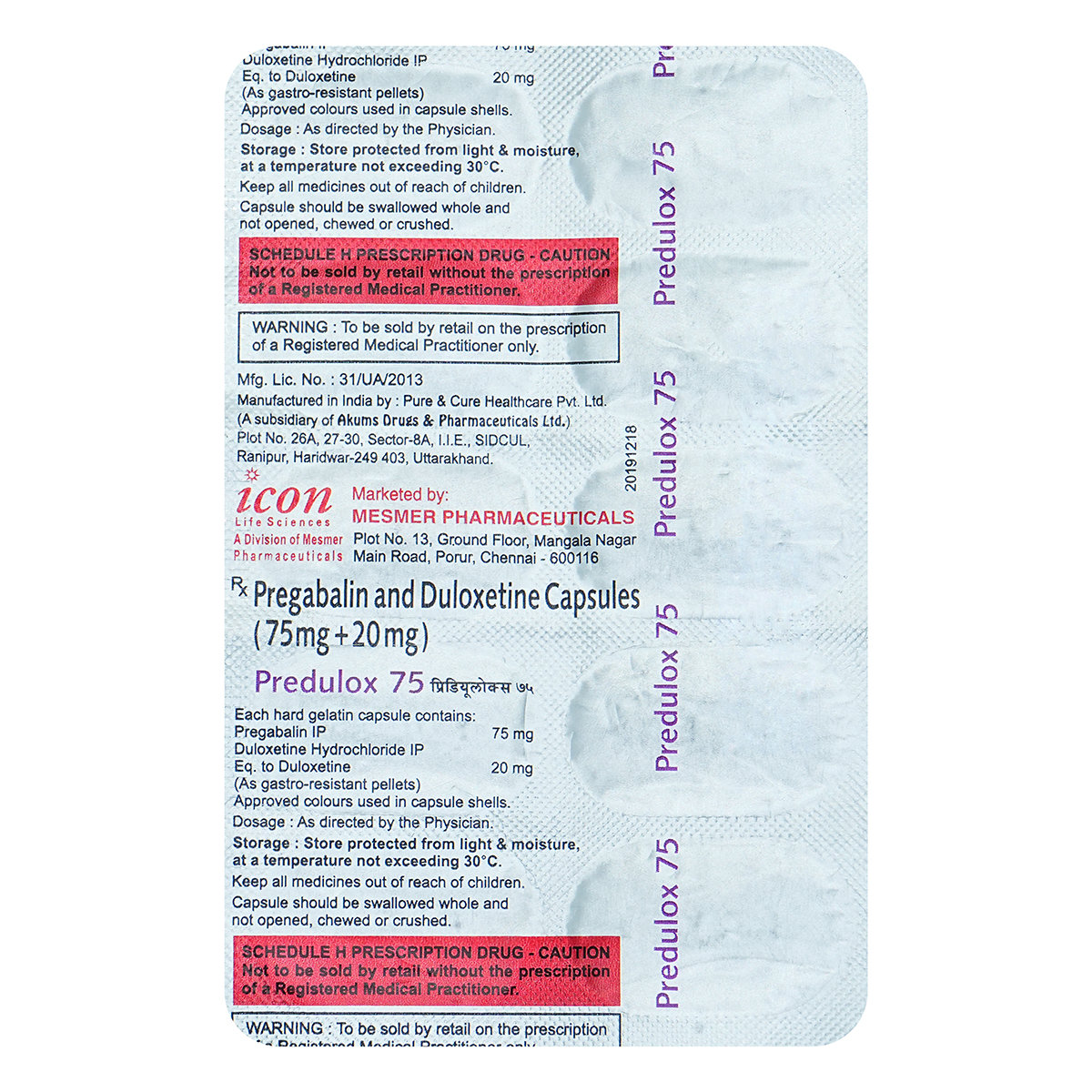


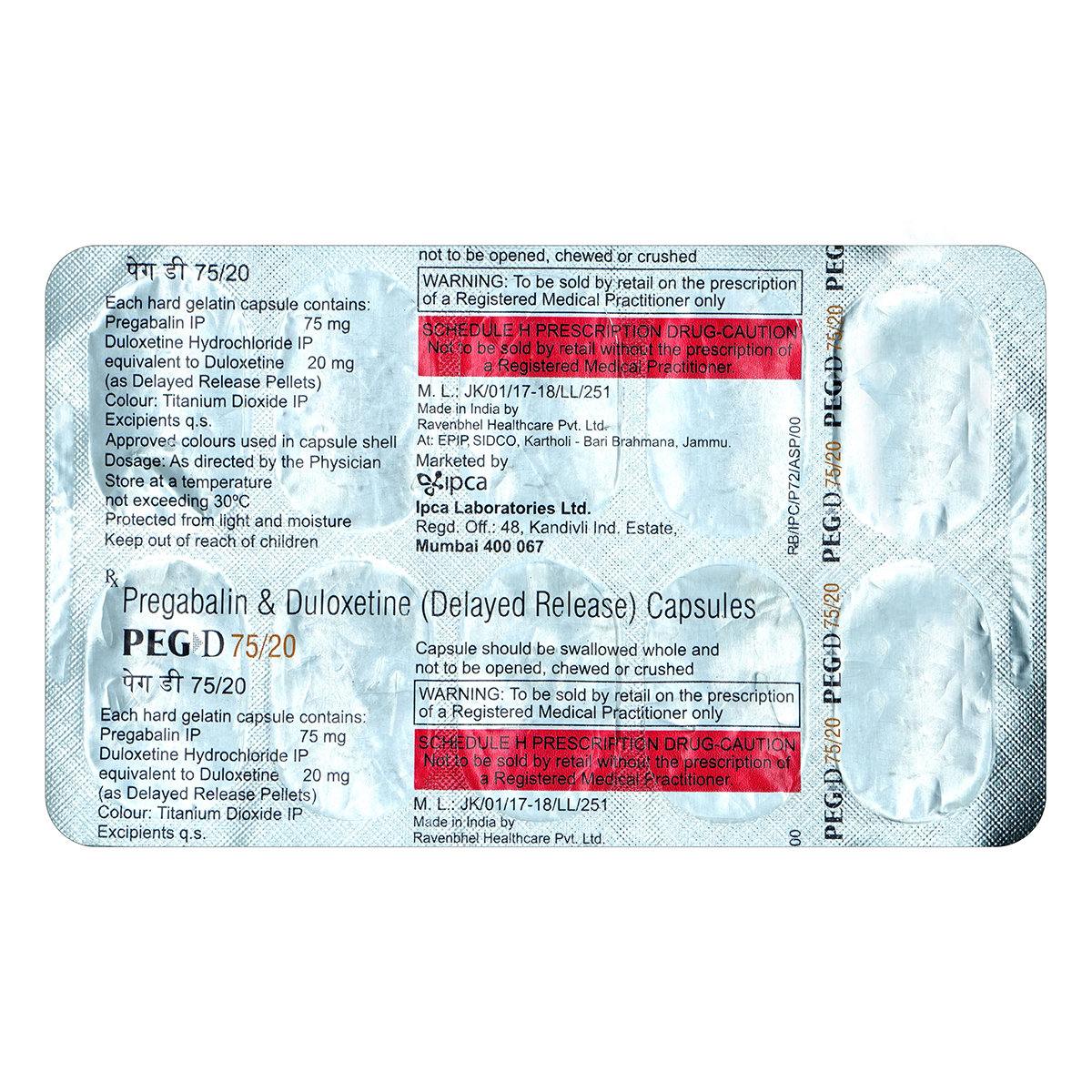
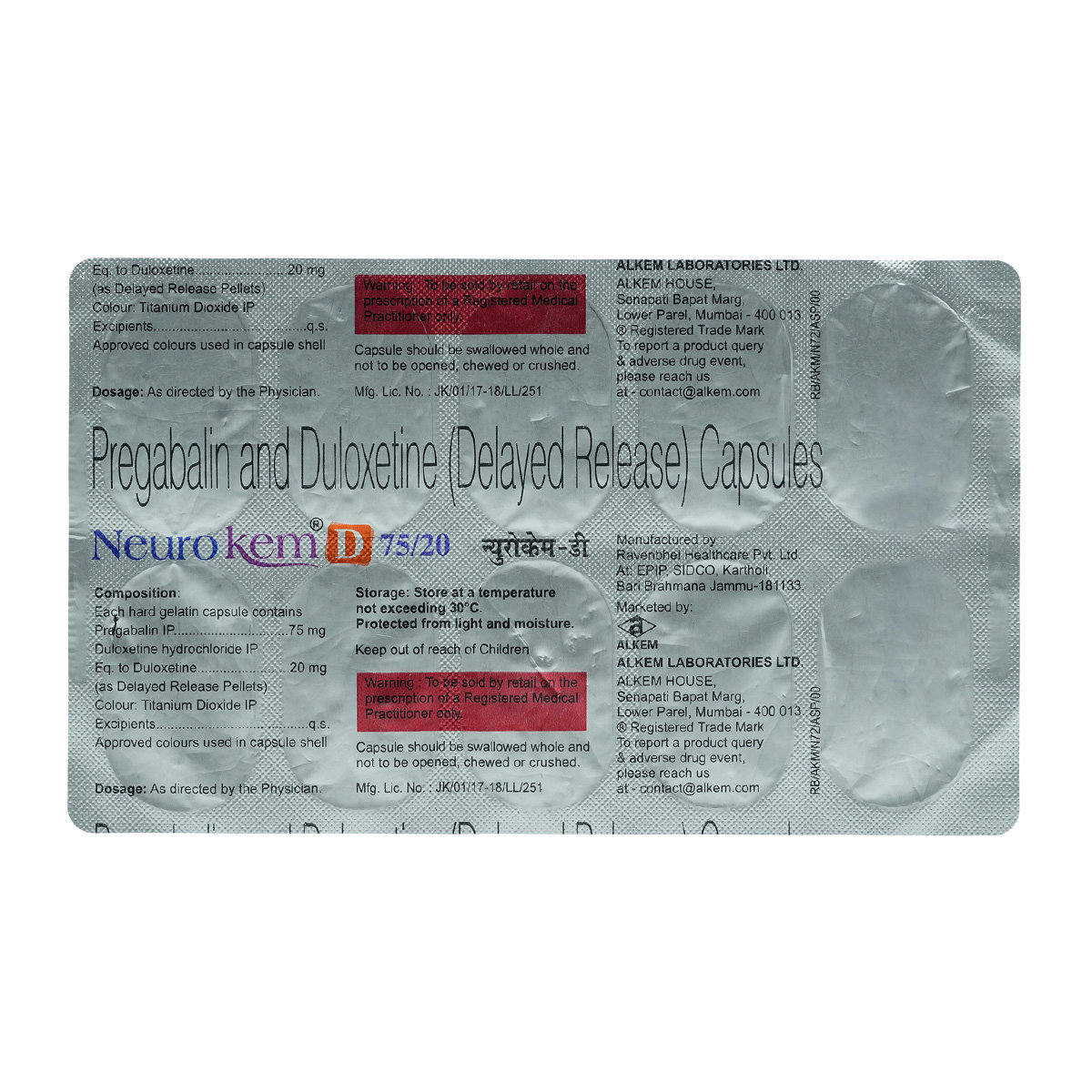
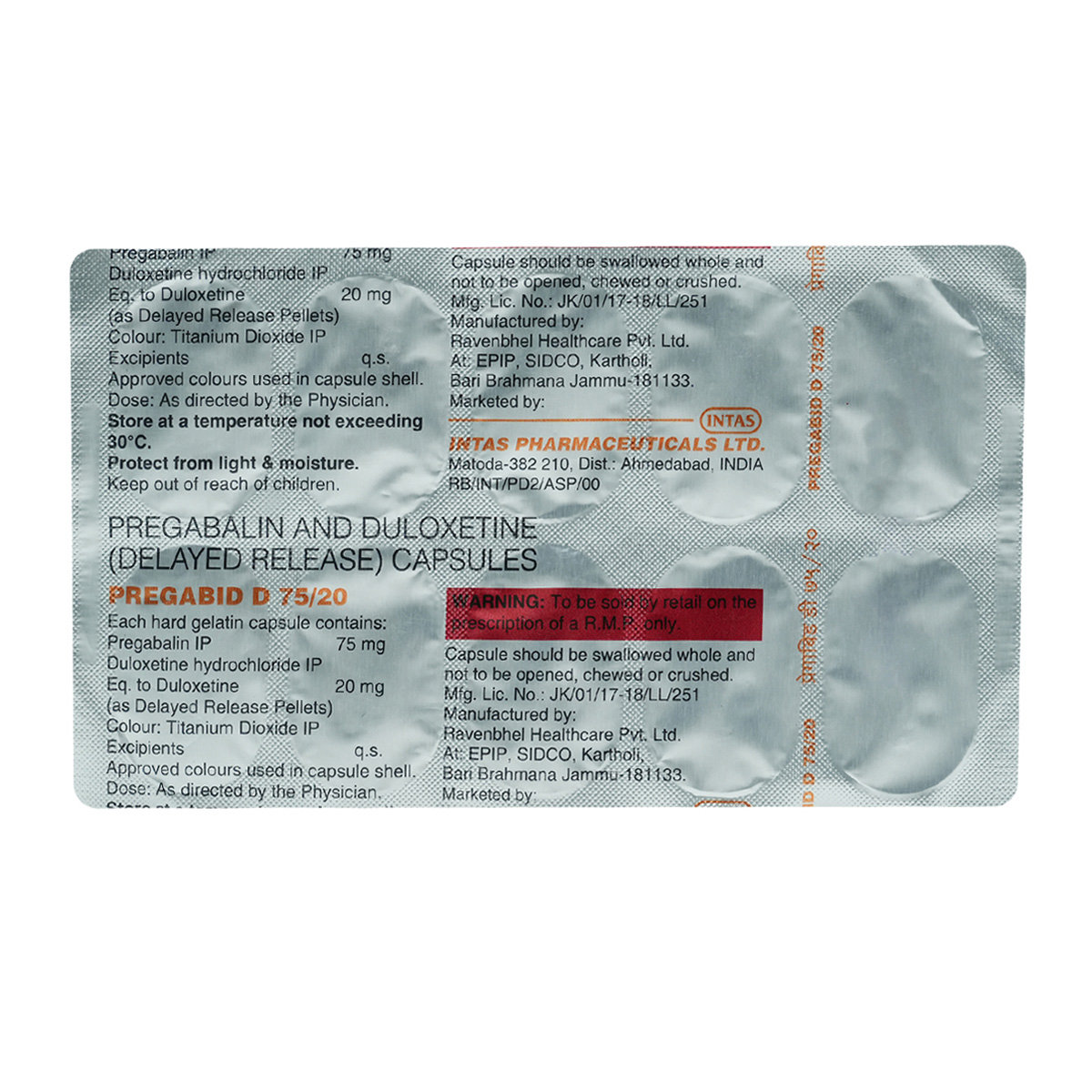
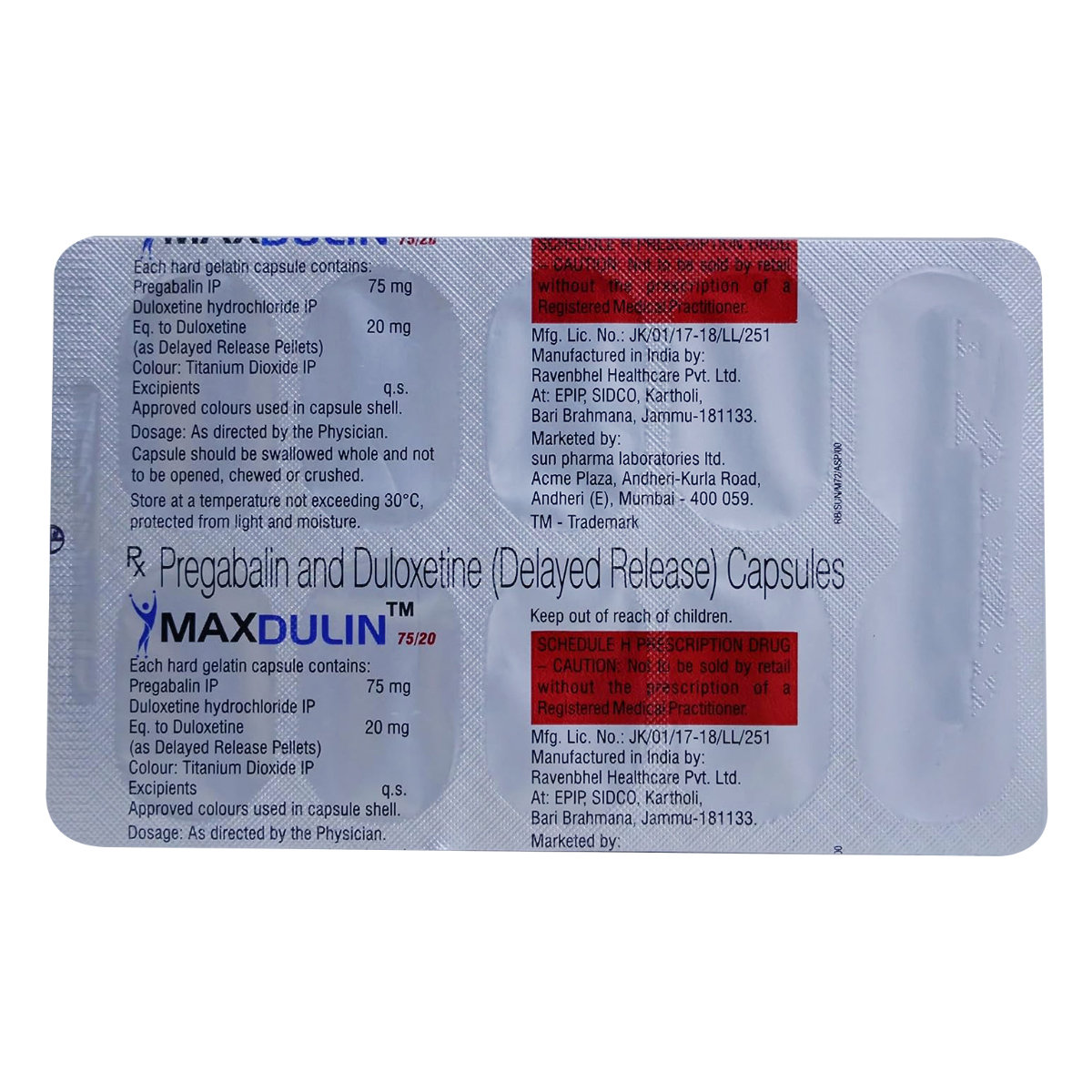
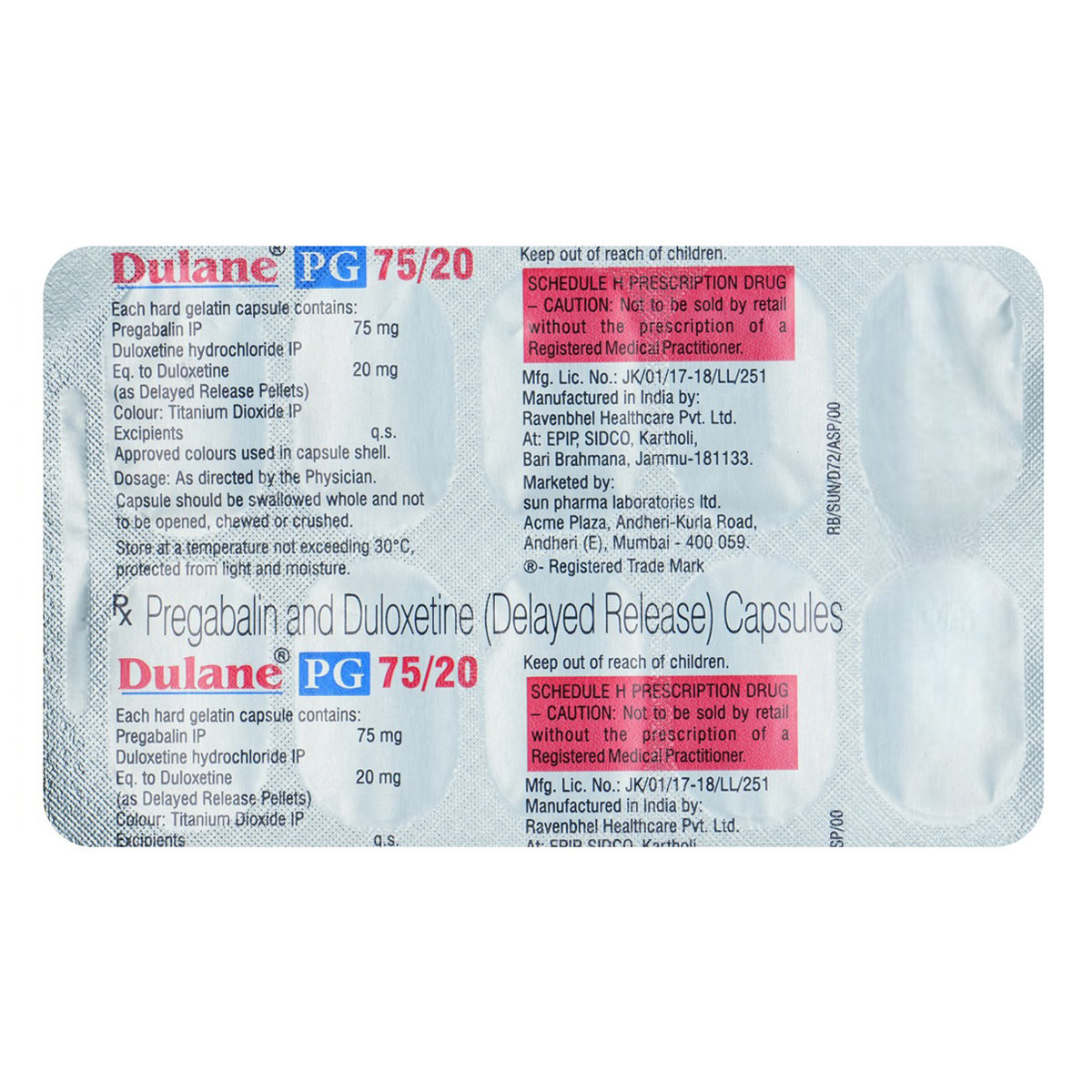
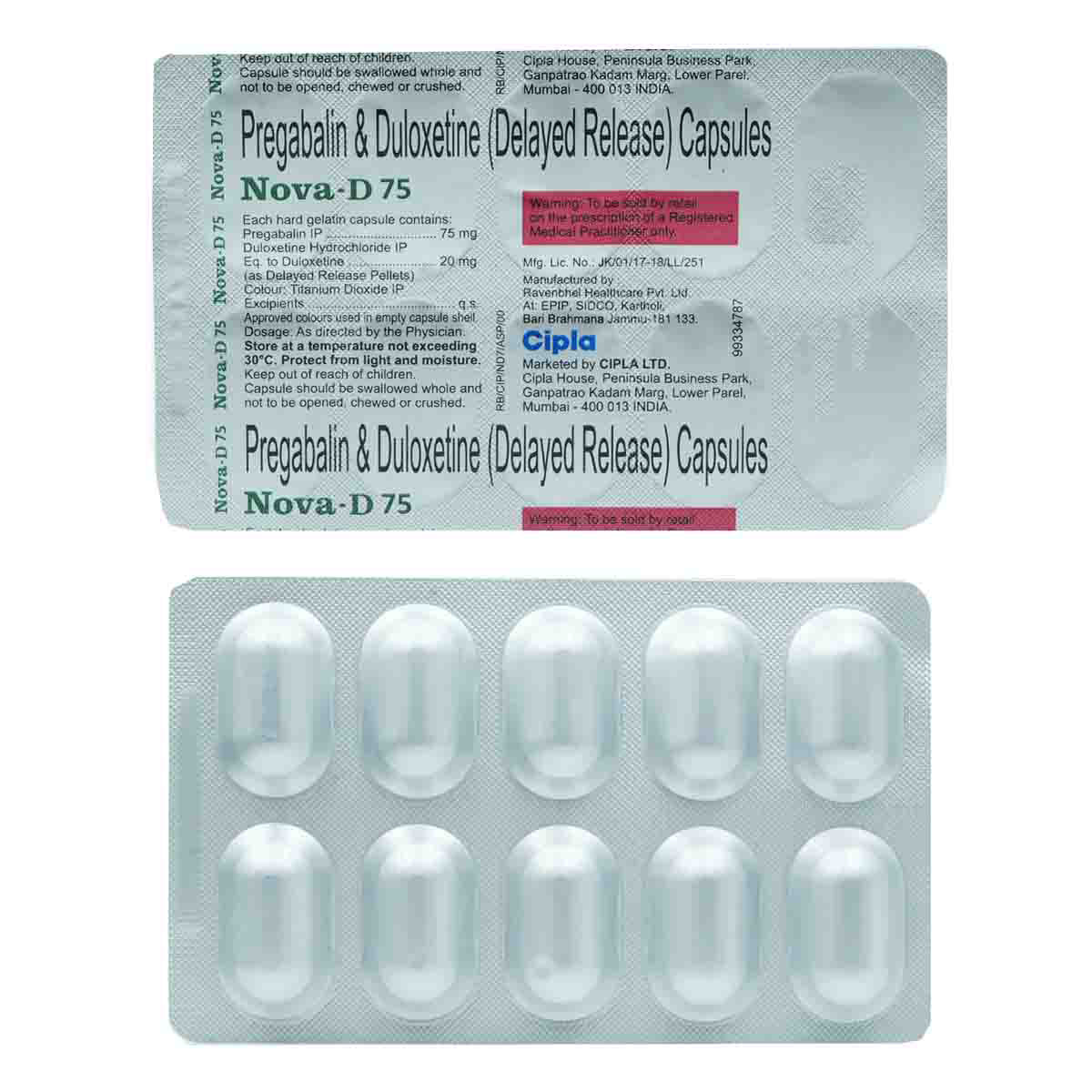
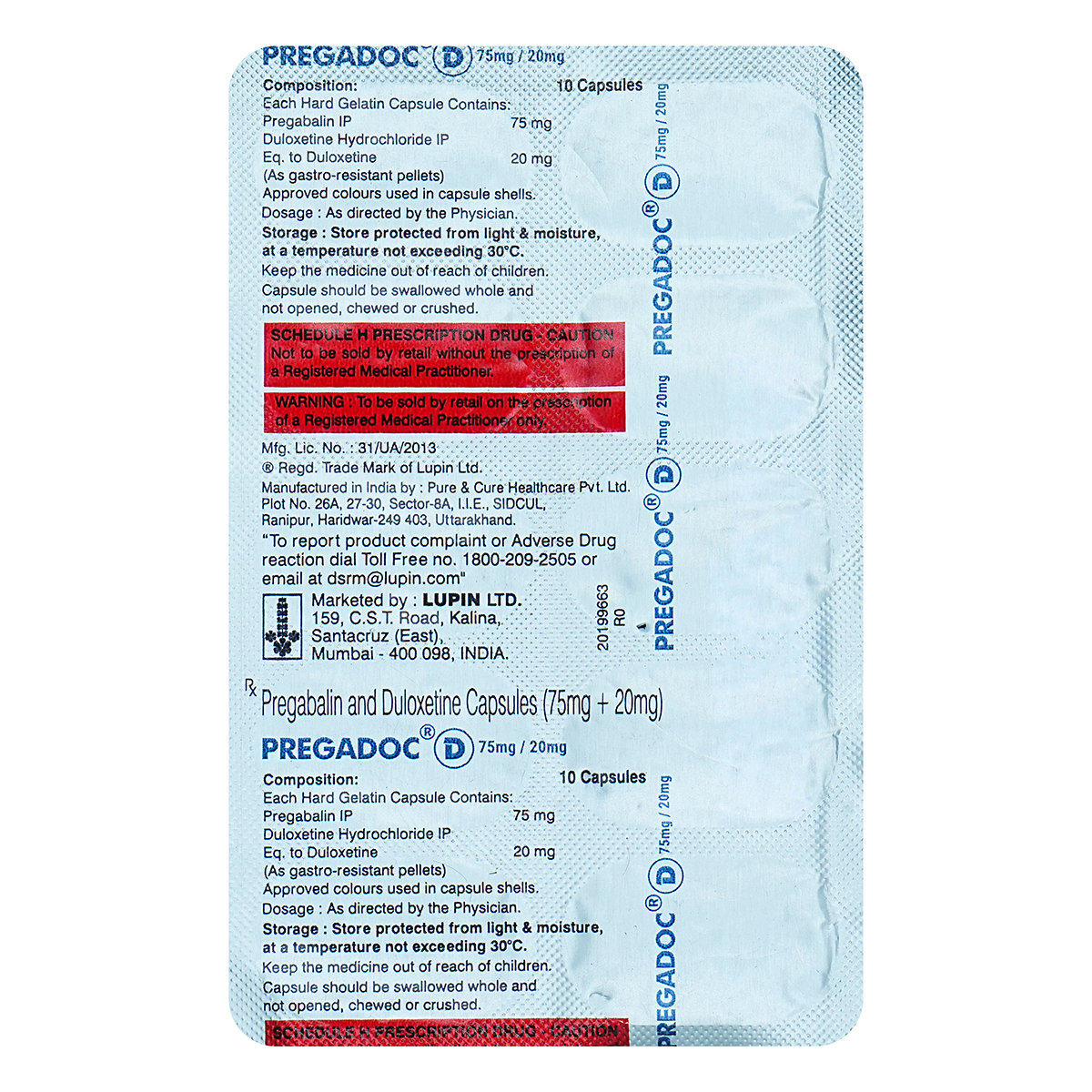
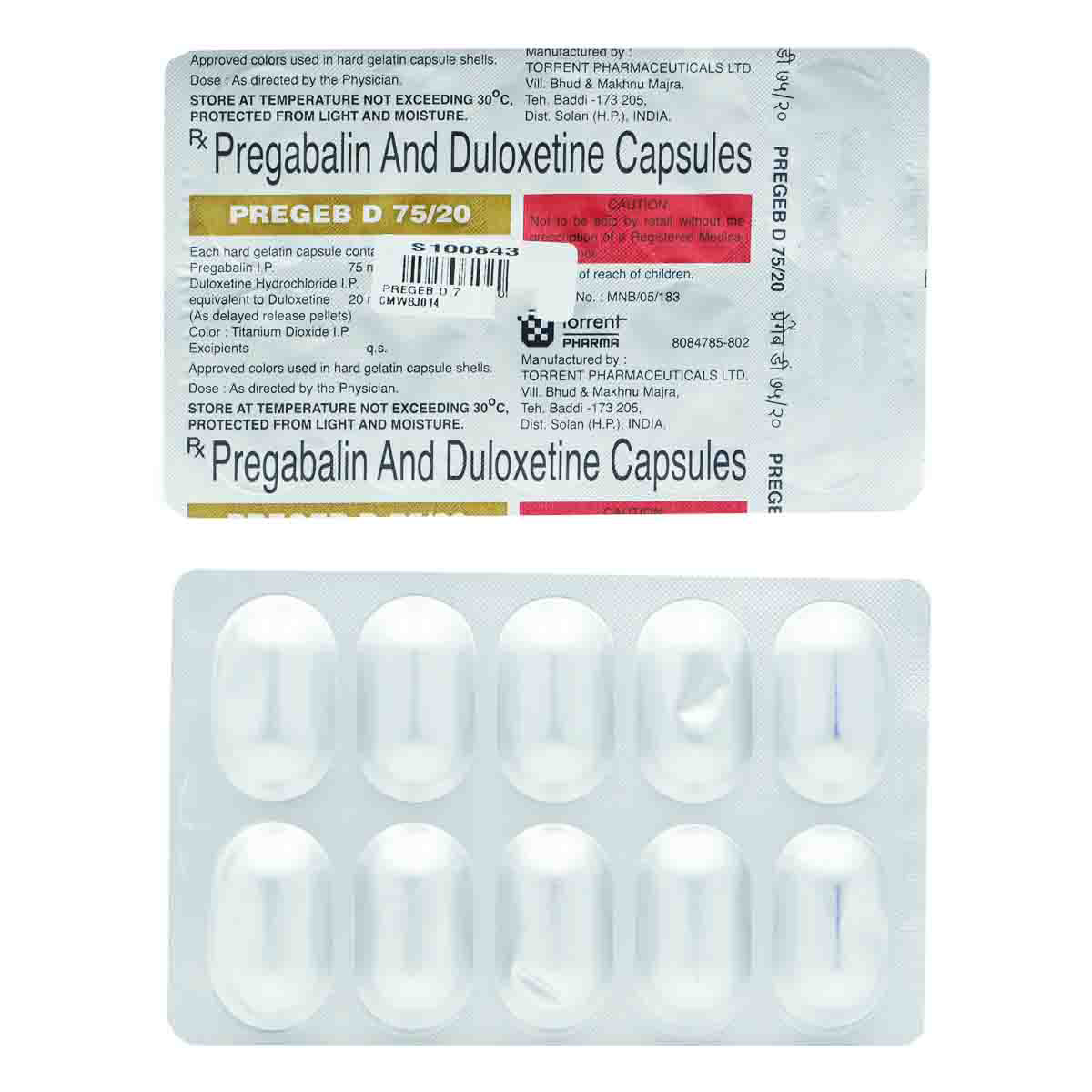

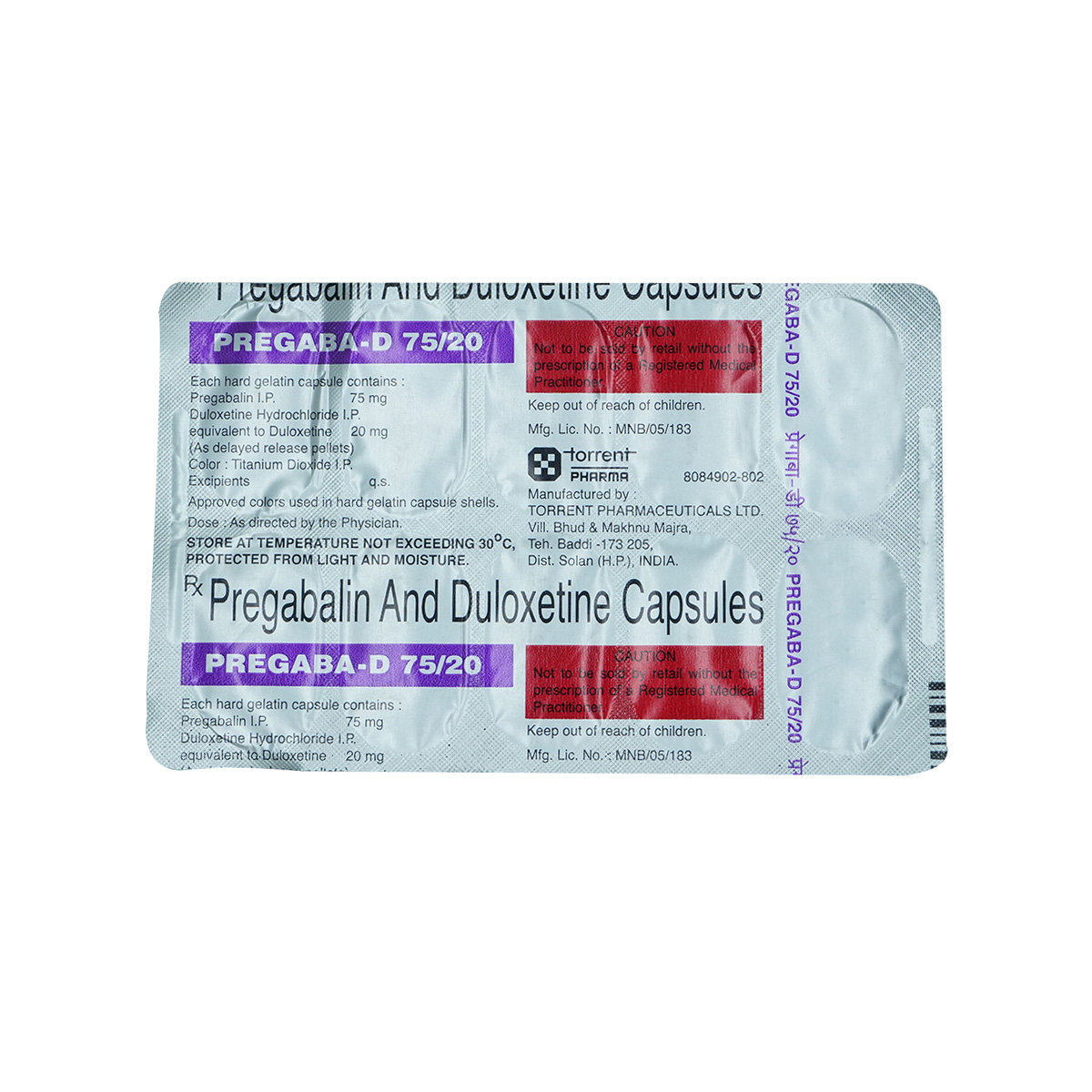
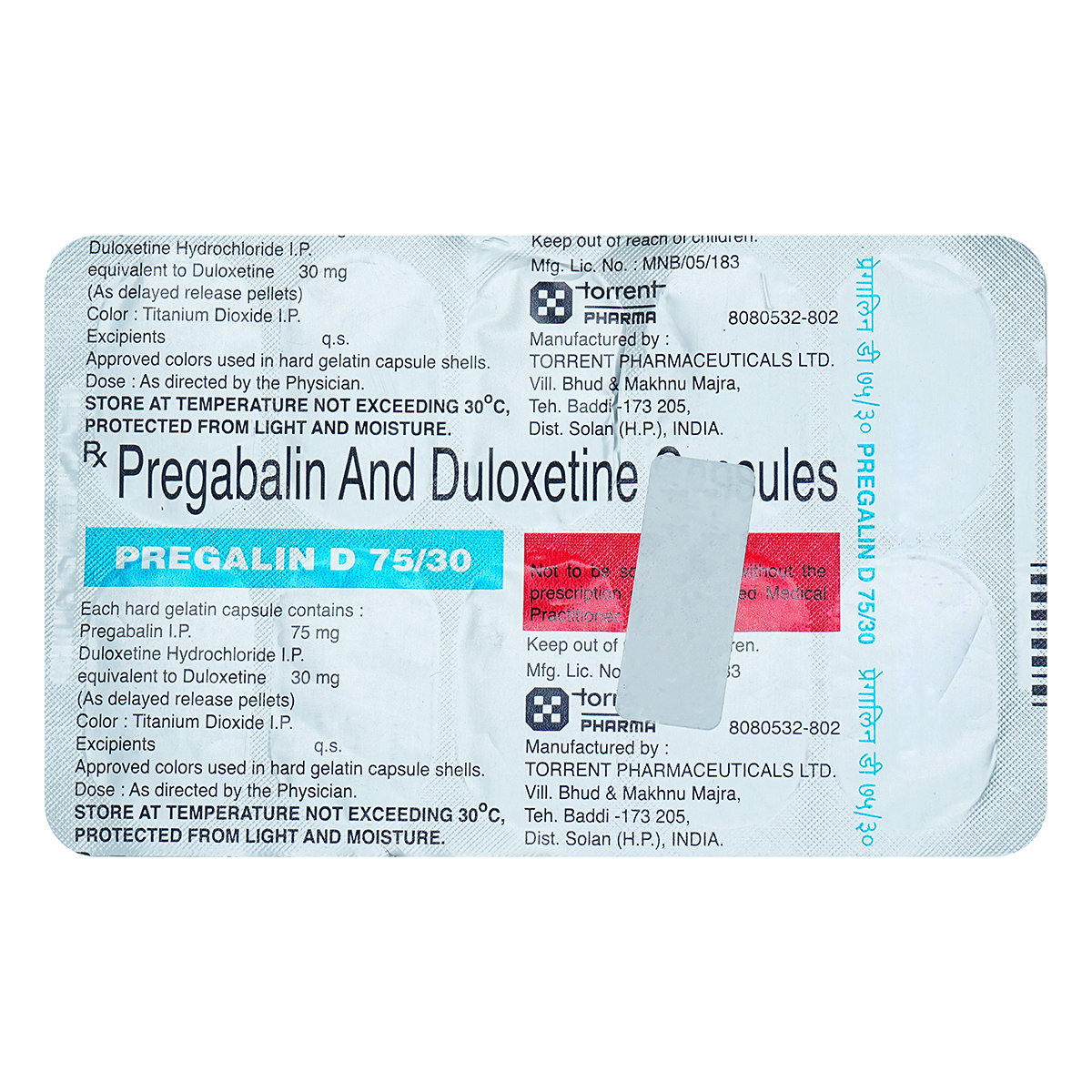

.jpg?tr=q-85)

